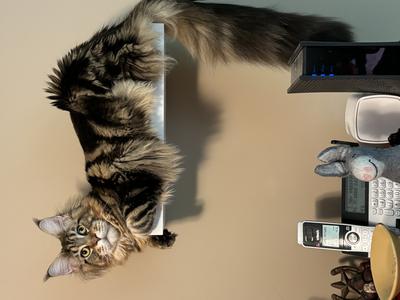- Home
- Maine Coon Cat Health
- Giardia in Cats
What is Giardia in Cats?
Testing our Maine Coons for Parasites?
by: The Maine Coon Cat Nation Community!
by Connie in Michigan:
I’m a little stressed about what to do regarding my choice of vet.
We have our 14-month-old Nala and her little brother Gunny (same parents).
Recently, Gunny was at the vet for his regular checkup, and they tested him for parasites. He was diagnosed with Giardia.
At first, the vet didn’t mention anything about testing or treating his sister, even though they share a litter box. I had to bring it up myself.
After I asked, the vet said, “Oh yes, we probably should,” as if it were an afterthought. That response didn’t sit well with me.
 Gunny
GunnyWhen we got Nala at 10 months old, and then Gunny six weeks later, the breeder recommended a vet who specializes in Maine Coons.
But this experience made me wonder if they were the best choice for my babies.
To double-check, I contacted my previous vet (who we used for our domestic cats) and brought them a stool sample to test. They told me it came back negative.
I asked if they checked for Giardia specifically, and they said no. Is it normal for vets not to test for it unless specifically requested?
I later returned to the first vet, and their stool test confirmed it. It’s been confusing and frustrating to get different feedback from different vets.
The first vet gave me detailed instructions for sterilizing my home - bleaching floors, washing bedding, and cleaning like crazy.
The second vet was much more relaxed, saying, “If everything is dry, the parasites will just die. Don’t worry too much - they’re still just cats.”
Okay, but these aren’t just cats - these are my babies! I’ve been cleaning their litter box twice a day and doing my best, but I’m exhausted, stressed, and worried about not doing enough.
Now I’m questioning whether to stick with the first vet. I want to make the best choice for Nala and Gunny. Any advice or suggestions would be greatly appreciated.
Reply:
Hi Connie,
Thank you for sharing your story! First off, you’re doing an incredible job by being so proactive in seeking the best care for Nala and Gunny.
When it comes to feline Giardia, it’s important to know that this parasite can be stubborn, especially in multi-cat households.
(For anyone wondering, what is Giardia in cats? It’s a microscopic parasite that can cause diarrhea, weight loss, and sometimes no symptoms at all!)
The differing advice from your vets must be incredibly frustrating, but unfortunately, it’s not uncommon.
Some vets are more thorough with parasite testing and treatment than others. This problem isn’t Maine Coon-specific; it can affect any cat, and it does require diligent cleaning while the medication runs its course.
Since you’re worried about sterilizing your home, here’s what is usually recommended: vacuuming daily, focusing on cleaning high-traffic areas with an enzymatic cleaner, and washing anything washable (like bedding) on a hot cycle.
For carpets and furniture, steam cleaning is a good option. Giardia thrives in moisture, so keeping everything dry helps a lot.
You’re doing all the right things by being attentive, asking questions, and double-checking with different vets.
Trust your instincts - if one vet feels dismissive or not thorough, it’s okay to seek a second opinion. Your peace of mind is worth it.
Comments:
Response
By: Connie
Thank you for your helpful information! My husband and I had three wonderful cats from our local shelter: Nimshi (who lived to 22 years old), Naesan (17 ½ years), and Neko (15 ½ years).
We just lost our sweet Neko this past August. We truly loved them all and miss them dearly.
Now, with our Maine Coons, Nala and Gunny, I’ve learned that they are slow-growing cats, taking 3–5 years to fully mature.
I’ve also been told to be very careful with their diet during their developmental years, which makes me extra cautious about anything that could harm them. That’s why discovering this has been so concerning for me.
I hope the treatment they’re on is effective. They have another appointment next Monday, so I’ll see what the vet says then.
It’s definitely stressful trying to find a vet who understands and works well with Maine Coons. Thank you again for the guidance!
Parasitic Infection
by Charles Dove
I adopted my Maine Coon in September when he was 12 weeks old. A week later, he developed diarrhea.
After waiting too long for stool test results from my regular vet, I took him to a specialty hospital.
They immediately started him on Fenbendazole and Metronidazole for potential parasitic infection, as well as FortiFlora probiotics. Within two days, the diarrhea stopped, and he’s been thriving ever since.
FortiFlora worked wonders for him! I hope Gunny is doing well and that you’ve found a vet you trust.
Answers
The vets you’ve seen don’t seem to be following standard protocol. This isn’t specific to Maine Coons - it can affect any cat.
The most important step is a fecal flotation test to identify the exact parasite. Giardia and Coccidia have similar symptoms but require different medications to treat.
Once diagnosed, both are treatable with common veterinary medications.
For anyone needing more information, this resource is helpful: https://vcahospitals.com/know-your-pet/giardia-in-cats
What is Giardia in Cats? - FAQs
What is Giardia in cats, and how do they get it?
What is Giardia in cats, and how do they get it?
It's a microscopic parasite that infects the intestines, causing gastrointestinal issues like diarrhea.
Felines typically contract it by ingesting contaminated water, food, or fecal matter.
The parasite is more common in environments where multiple animals are housed together, such as shelters or catteries.
What are the symptoms of feline Giardia?
What are the symptoms of feline Giardia?
The most common symptom is persistent diarrhea, which may be soft, watery, or have a foul odor.
Other symptoms can include lethargy, weight loss, and a bloated or gassy appearance. Some cats may carry the parasite without showing any symptoms.
How is feline Giardia diagnosed?
How is feline Giardia diagnosed?
A fecal flotation test is commonly used. The test involves examining a sample of the cat's stool under a microscope to identify the presence of Giardia cysts.
In some cases, an antigen test or PCR test may also be used for more accurate results.
How is Giardia treated in cats?
Treatment usually involves medication such as fenbendazole or metronidazole, which are effective at eliminating the parasite.
Your vet may also recommend probiotics like FortiFlora to support gut health during and after treatment.
It's essential to complete the full course of medication, even if symptoms improve.
How can I clean my home to prevent reinfection?
To prevent reinfection, clean and disinfect litter boxes daily using hot water and a pet-safe disinfectant.
Wash bedding, toys, and food dishes frequently in hot water. For carpets and furniture, vacuum thoroughly and use a steam cleaner if possible.
Giardia cysts are susceptible to drying out, so keeping surfaces dry can also help reduce contamination.
A note about comments: This discussion has been edited for readability, clarity and length. As the nature of the internet evolves, we strive to keep our content as fresh possible!
Comments-enabled pages can become unwieldly, so they are being updated to static web pages.
But with that said, we love community! That's why we've launched a Member's Area, with lots of goodies including the ability to comment, post and discuss all kinds of Coonie topics. It's the place to be if you want to chat and connect with others 🐾
Top of: What is Giardia in Cats?
« Back to Maine Coon Health
Recent Articles
-
Today's Features
Apr 16, 25 09:54 PM
Today we have two classic Memory Lane pages to share!
Murphy & Candy Cane: Double the Maine Coon Charm - This adorable Maine Coon duo from our 2011 Photo Albums - Murphy and Candy Cane - brought doubl… -
Memory Lane Month Begins!
Apr 15, 25 10:22 PM
We're thrilled to start our "Memory Lane Month" event by visiting some cherished moments from our community! We're in the process of restoring meaningful community stories like this one, to preserve t… -
Will a Maine Coon Protect Its Owner From Danger or an Intruder?
Apr 09, 25 10:41 PM
Plenty of people are curious: Will a Maine Coon protect its owner if something happens? Let’s talk about what this means, and what kind of protector a Coonie is.



